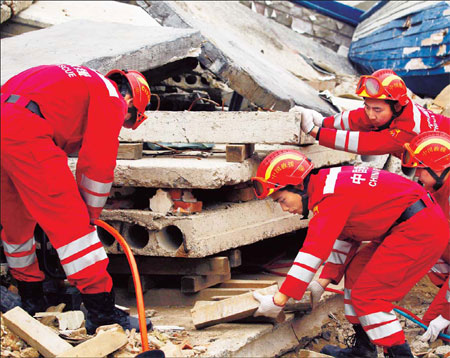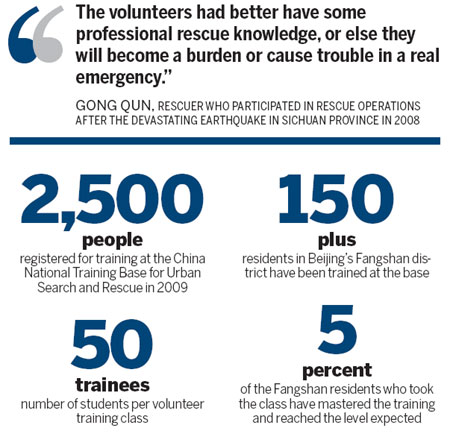Emergency rescue volunteers need more training
Updated: 2011-11-07 07:36
By Cao Yin (China Daily)
|
|||||||||
BEIJING - New ways are needed to attract capable volunteers and provide adequate training, an insider from the national search and rescue team said on Sunday.
 |
|
Members of the Chinese International Search and Rescue Team conduct an earthquake drill in Beijing on Thursday. [Photo / China Daily] |
The number of volunteers specializing in emergency rescue is very small compared with the country's total population and they do not receive enough training, said Wang Nianfa, a trainer at the China National Training Base for Urban Search and Rescue.
"Although many people come to our base for training every year, the number who finally become real volunteer rescuers is still limited," he said.
In 2009, about 2,500 people, including university students and businessmen, registered for training at the base, but even though they completed their training they may not be able to handle some emergency situations.
"The volunteers had better have some professional rescue knowledge, or else they will become a burden or cause trouble in a real emergency," said Gong Qun, a rescuer who participated in rescue operations after the devastating earthquake in Sichuan province in 2008.

"However, the participants just obtain a little experience by participating in the two-day training," said Zhang Jianqiang, another trainer at the base.
A volunteer training class at the base has 50 trainees and requires at least four trainers, but the base has only 12 trainers who not only teach the nation's professional rescuers, but also have to stand by in case of emergencies, he added.
Zhao Zheng, an official in charge of an emergency rescue squad at the civil defense bureau in Beijing's Fangshan district, told China Daily that not all applicants are suitable for rescue work.
"Some people with little spare time participated in the training half-heartedly, and some without any basic self-protection knowledge couldn't deal with the difficult rescue work," he said.
Since 2008, more than 150 residents in Fangshan have been trained in the group, but Zhao estimated only 5 percent of them mastered the training and reached the level expected.
Wang Kai, a 21-year-old student who took part in a mountain rescue in Fangshan district last year, said that what the volunteers need most is the simulation drills.
Both Zhang and Zhao suggested establishing a long-term education system for emergency rescue volunteers and encouraging them to spread their knowledge to the public.
Wu Yong contributed to this story.











